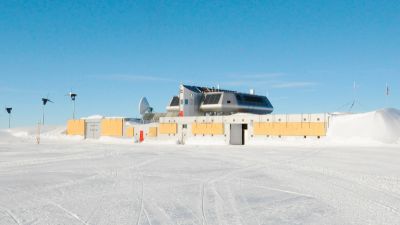
Ready to Leave!!
The final days of the 2021-22 season are upon us and they have been busy ones as we prepare to leave the Princess Elisabeth Antarctica on her own until the next team arrives in November.
With the water treatment system closed down, the last few days at the station are a bit like camping as we wait for the plane to take them to Novo Station and then on to Cape Town. We hope to be in Cape Town within the coming days.
In service to science
Scientific equipment at the station relies heavily on the station's systems to continue functioning properly. They have to continue collecting data for scientists autonomously and sending it to Europe throughout the austral winter. So the station needs to be able to keep running on its own.
Over the last few days of the season, Station Engineer Johnny Gaelens and the rest of the IPF technical team have been checking and double-checking to make sure that every single system at the station is working properly, and that it has a redundant system to back it up just in case there’s an issue with the main systems. Checking that all these backup systems are properly functioning is a painstaking but extremely important process.
For example, the Programmable Logic Controller (PLC), which is the brain of the station that prioritises energy use in the building, has a backup PLC. And the satellite communications system is backed up with iridium and Inmarsat systems.
Any data collected during the season that can’t be sent via satellite is put on a hard drive and is taken back to Europe with the final team to leave the station for the season. Along wiht many other things, we're repatriating a whopping 1.5 Terabytes of data for scientists this season!
The same is true for any scientific instruments that aren’t stored at the station during the winter. These instruments also head back to Europe with the team, where scientists can recalibrate them or preform any other necessary maintenance on them.
Dormant energy needs
The Princess Elisabeth will continue to produce energy for all these systems to run on throughout the winter. However, as the days become shorter and shorter and there is less and less sunlight to power the solar panels (many of which have been boarded up anyway to protect them against damage during the winter), the station will rely increasingly on its wind turbines to produce energy. Between May 15th and July 28th the sun won’t rise above the horizon at all at PEA. The station will experience polar night for more than two months, with only about two hours of twilight around midday on the winter solstice.
In the event that the wind turbines don’t produce enough energy to keep the batteries charged and the systems running, there is an emergency genset that can start up to charge the batteries. However the station’s energy needs during the winter are so low and there are usually enough katabatic winds coming form the interior of the continent that this raerley, if ever, happens.
An accompllished season
As we close out the 2021-22 season, we are proud to say that the station again ran entirely on renewable energy over the course of the nearly four months it was occupied. At no time was it necessary to start the genset to recharge the batteries.
What’s more, back in December, the Princess got an electric vehicle to accompany it. The pioneering Venturi Antarctica will remain at the station during the winter to welcome us back when we return in November.
Together with the zero-emission target reached and despite several difficulties during this particular expedition, the IPF team will soon leave the station with the satisfaction of having executed a successful mission. Only one team of scientists was obliged to postpone their participation due to unprecedented bad weather conditions in the vicinity of the Sør Rondane Mountains this past season.
All other scientific teams who were scheduled to condouct reeaserch at the Pricness Elisabeth Antarctica completed their missions and head home knowing that they accomplished world-class research in Antarctica. Datasets are already being processed and samples will be shipped to research institutions and universities for study.
Throughout the winter, PEA will continue to collect data for scientists until it's time for BELARE 2022-23 to start. We're looking forward to that moment with great enthusiasm!
Picture: The Princess Elisabeth's solar panels have been boarded up to protect them against harsh winter conditions - © International Polar Foundation
